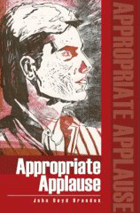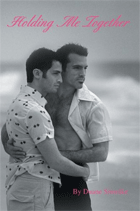 Ronald L.
Donaghe reviews three books, this issue:
Ronald L.
Donaghe reviews three books, this issue:• Appropriate Applause by John Boyd Brandon
• Holding Me Together by Duane Simolke
• What God Has Joined Together, page 9
  Appropriate Applause Appropriate Applauseby John Boyd Brandon (see bio) Paperback and Hardback ISBN 0-595-31435-x (paper) 144 pages, $12.95 iUniverse, 2004 Occasionally a book comes along that reveals the true heart of the writer. Appropriate Applause is just that kind of book. The book jacket summarizes the plot of the story: Scott Morgan is a young artistic gay man who moves to Jemez Springs, New Mexico, from Chicago with his mother, Lydia, and his homophobic father, Walter. For years, Scott has been afraid that his father will discover that he is gay. Walter has disliked gay men ever since he was ten years old and went through a terrifying experience. In his new home of Jemez Springs, Scott meets and falls in love with a young man named Vallie. Walter finds out about this relationship and attempts to stop it. Scott's depression over his father's nasty behavior leads him to attempt suicide. Scott begins seeing a psychiatrist to deal with the trouble he and his father have shared. Walter also begins seeing the psychiatrist. He feels troubled that his nasty attitude about gay men almost caused his son's death. Family conflicts coil in a tangle of misunderstanding and hope. Will Scott and his father resume some sort of family relationship? At first I thought the jacket summary reveals too much, because the playing out of the story is where the interest lies. The reader already knows that Scott is going to attempt suicide; so we are not surprised when the attempt is made. But, how the attempt is made and why is central to the story and, in fact becomes one of the most important elements in ways the reader cannot anticipate. We also know that the father has a "terrifying experience" as a child and we assume it is with a man since he is so homophobic, though we certainly cannot imagine the grim details. So, instead of reading for the enjoyment and interest of the unfolding story, we must read it for the details. This is where the heart of the writer comes in. Much of the description of the setting of Jemez Springs and the surrounding area is revealed through the brush strokes of an artist turned writer. Through the narrator's voice he says: "The sky was an explosion...an odd mixture of a furious white and blue, as if an expressionist painter had gone completely mad with his paintbrush." I looked forward to reading this novel, mainly because of the gay content, but also because of the New Mexico setting, and I was not disappointed. In the hands of a real-life artist we get an artist's description. Here's another: "I looked up and saw that the sky was turning a breathtaking cerulean blue..." Or "the positive-negative space, the combination of the sun and the shadows..." All this reveals an artist's eye. But the heart of this writer is also revealed and does not disappoint in the many different characters he creates, from Vallie's mother's rather earthy joy of life, to Vallie himself, to the main character Scott. But by far the most complex character is that of Walter, Scott's "homophobic" father. He is actually painted with delicate brush strokes, from the angry pallet of his abusive nature toward his son when he discovers that Scott is gay, to the more soothing tones in the way the writer begins to reveal Walter's own horrific background. Walter is, in the end, a completely sympathetic character. We may not readily like him, but we do understand him as the book unfolds. And we discover what the rather intriguing title of "appropriate applause" means. This novel is John Boyd Brandon's first. We forgive him that his characters all speak perfect English. The character differences are not revealed in their speech patterns but in what they say. So I look forward to reading the already published follow-on story in this series: The Boy at the Window. Brandon is currently at work on a third book, and I can only hope that it is a continuation of the story of Scott and Vallie. —Ronald L. Donaghe, Las
Cruces, NM
|
  Holding Me Together Holding Me Togetherby Duane Simolke Paperback, 196 pages, $17.95 iUniverse (2nd edition, 2005) ISBN: 0-595-36673-2 This revised, second edition begins with an updated version of his multi-part essay, "Reactions to Homophobia." Duane Simolke's seminal work Holding Me Together is a gratifying mixture of scholarship, art, and personal expression. In the long essay, "Reactions to Homophobia," readers will meet an intelligent and patient narrator who takes virtually every ignorant question and misstatement seemingly ever made about gays and lesbians and, as though speaking to those who ask such questions or make disparaging remarks about homosexuals, refutes the ignorance. Simolke sheds a brilliant light into the dark recesses of homophobia. But Holding Me Together is more than a refutation of homophobia. It is also a quite brilliant and accessible apologia for those who know that the Bible of Judeo-Christian heritage is chock full of contradictions yet are unable to point them out so well as Simolke does. At the same time, Simolke does not bash the Bible, but shows how it is truly utter nonsense to interpret its scripture so literally. The long essay is actually divided into a delightful collection of short pieces, focused around the notion that he is speaking to homophobes, fundamentalists, concerned (but ignorant) heterosexuals, and others. A short list of the subtitles of "Reactions to Homophobia" indicates what the reader can look forward to. "Unlike gay people, I don't tell people what my wife and I do in bed." "If a normal guy or a white guy gets beat up, hate crimes laws can't help him. That isn't fair." "Homosexuals can't be Christians." "The parts don't fit." "Gay people should try to be cured." But this book is more than the long essay. Part Two is a collection of poems that are both soft-spoken and interior to the writer and yet so forceful, reading them is like being knocked over with a feather-you feel a gentle touch, but are left stunned as in the multi-part poem "Faces, Parts I-VII." You cannot simply contemplate the devastation of AIDS on its innocent victims. Simolke will not let you merely feel the gentle touch of his poem about Jessica and other faces; you must also confront those who "Thank God for AIDS." In short, Duane Simolke's voice is gentle, reasoned, assured, but will leave you gasping for breath. Ultimately, you will be more knowledgeable at the end of the work than you were at the beginning. —Ronald L. Donaghe, Las
Cruces, NM
|